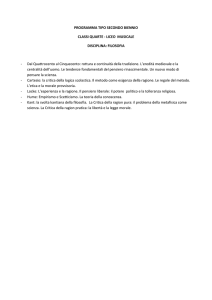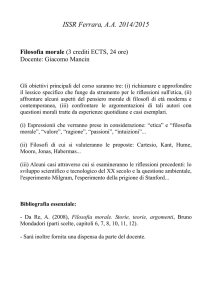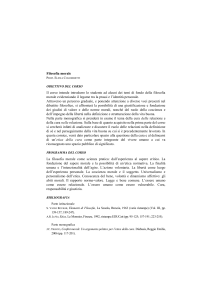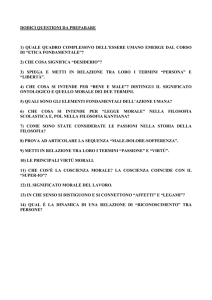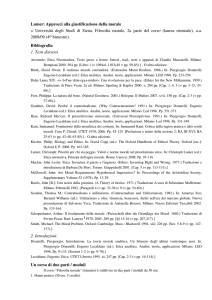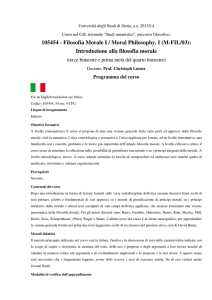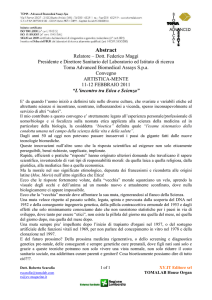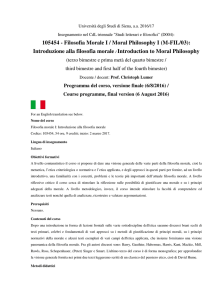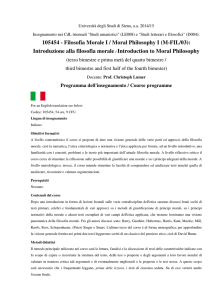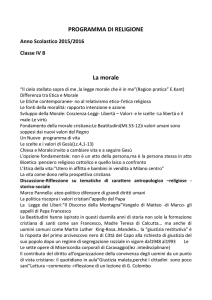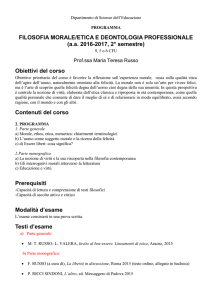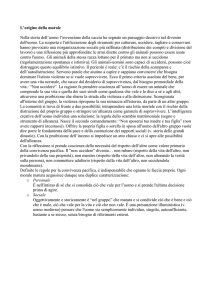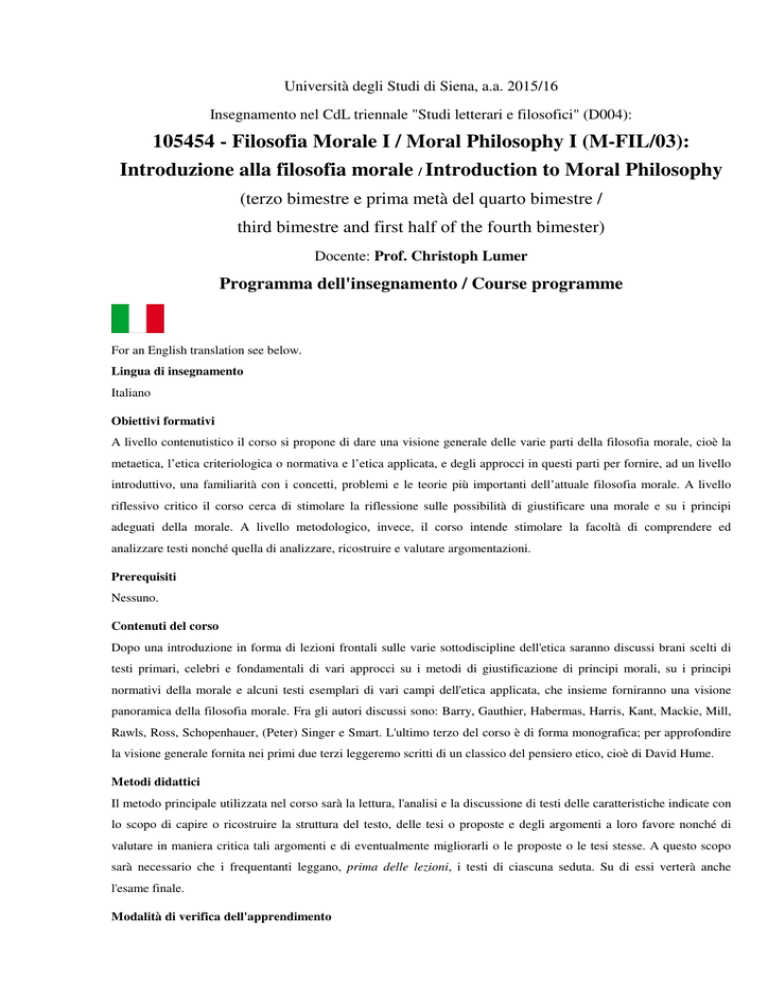
Università degli Studi di Siena, a.a. 2015/16
Insegnamento nel CdL triennale "Studi letterari e filosofici" (D004):
105454 - Filosofia Morale I / Moral Philosophy I (M-FIL/03):
Introduzione alla filosofia morale / Introduction to Moral Philosophy
(terzo bimestre e prima metà del quarto bimestre /
third bimestre and first half of the fourth bimester)
Docente: Prof. Christoph Lumer
Programma dell'insegnamento / Course programme
For an English translation see below.
Lingua di insegnamento
Italiano
Obiettivi formativi
A livello contenutistico il corso si propone di dare una visione generale delle varie parti della filosofia morale, cioè la
metaetica, l’etica criteriologica o normativa e l’etica applicata, e degli approcci in questi parti per fornire, ad un livello
introduttivo, una familiarità con i concetti, problemi e le teorie più importanti dell’attuale filosofia morale. A livello
riflessivo critico il corso cerca di stimolare la riflessione sulle possibilità di giustificare una morale e su i principi
adeguati della morale. A livello metodologico, invece, il corso intende stimolare la facoltà di comprendere ed
analizzare testi nonché quella di analizzare, ricostruire e valutare argomentazioni.
Prerequisiti
Nessuno.
Contenuti del corso
Dopo una introduzione in forma di lezioni frontali sulle varie sottodiscipline dell'etica saranno discussi brani scelti di
testi primari, celebri e fondamentali di vari approcci su i metodi di giustificazione di principi morali, su i principi
normativi della morale e alcuni testi esemplari di vari campi dell'etica applicata, che insieme forniranno una visione
panoramica della filosofia morale. Fra gli autori discussi sono: Barry, Gauthier, Habermas, Harris, Kant, Mackie, Mill,
Rawls, Ross, Schopenhauer, (Peter) Singer e Smart. L'ultimo terzo del corso è di forma monografica; per approfondire
la visione generale fornita nei primi due terzi leggeremo scritti di un classico del pensiero etico, cioè di David Hume.
Metodi didattici
Il metodo principale utilizzata nel corso sarà la lettura, l'analisi e la discussione di testi delle caratteristiche indicate con
lo scopo di capire o ricostruire la struttura del testo, delle tesi o proposte e degli argomenti a loro favore nonché di
valutare in maniera critica tali argomenti e di eventualmente migliorarli o le proposte o le tesi stesse. A questo scopo
sarà necessario che i frequentanti leggano, prima delle lezioni, i testi di ciascuna seduta. Su di essi verterà anche
l'esame finale.
Modalità di verifica dell'apprendimento
Lumer: Filosofia morale I: Introduzione alla filosofia morale, a.a. 2015/2016, programma
2
L'esame finale è di forma orale. L'esame verterà sulla ricostruzione delle tesi e degli argomenti sistematici degli autori
discussi.
PROGRAMMA D'ESAME
6 o 9 CFU: Al livello del corso di laurea triennale con questo corso è possibile di acquisire 6 o 9 CFU di Filosofia
Morale (M-FIL/03), codice *105454, secondo i parametri del proprio piano di studio. Chi ha bisogno di 6 CFU segue le
18 (36 ore) lezioni del terzo bimestre. Chi ha bisogno di 9 CFU segue le lezioni del terzo (18 lezioni) e del quarto
bimestre (altre 9 lezioni).
L'esame finale è di forma orale. Per sostenere l'esame di 6 crediti gli studenti devono presentare testi equivalenti a 8
articoli a scelta tra quelli discussi nella parte generale del seminario (bibliografia, parte 1). I testi o (se indicati) brani di
testo elencati di un singolo autore equivalgono sempre ad un'articolo. Per sostenere l'esame di 9 crediti invece, oltre al
programma per l'esame di 6 crediti, si deve presentare i brani scelti del "Trattato" di Hume (bibliografia, parte 2).
L'esame verterà sulla ricostruzione delle tesi e degli argomenti sistematici degli autori discussi.
PROGRAMMA D'ESAME PER GLI STUDENTI LAVORATORI E NON FREQUENTANTI
Essere frequentante del modulo significa di partecipare ad almeno 3/4 delle sedute, cioè almeno 14 sedute (delle 18 del
terzo bimestre) per 6 crediti e almeno 21 (delle 27) sedute per 9 crediti. Gli studenti lavoratori o non frequentanti
dovranno presentare i medesimi testi studiati dai frequentanti, tuttavia due in più, cioè: per 6 CFU: testi equivalenti ad
10 articoli; per 9 CFU: testi equivalenti ad 10 articoli (della parte 1 della bibliografia) più i brani scelti di tutte e due i
libri di Hume (bibliografia, parte 2). Ed in più dovranno studiare e presentare: 6 CFU: i brani indicati dei primi due
testi introduttivi di Donatelli e Lecaldano (bibliografia, parte 3); 9 CFU: i brani indicati di tutti e tre testi della parte 3
della bibliografia.
RIFERIMENTI BIBLIOGRAFICI
Introduzione alla filosofia morale
1. Testi discussi nella parte generale:
1.1. Metaetica: metodologia della giustificazione di principi morali
Gauthier, David: Perché il contrattualismo. (Why Contractarianism? 1991.) In: Piergiorgio Donatelli; Eugenio
Lecaldano (eds.): Etica analitica. Analisi, teorie, applicazioni. Milano: Led 1996. Pp. 351-371.
Kant, Immanuel: Fondazione della metafisica dei costumi. In: Immanuel Kant: Critica della ragion pratica e altri scritti
morali. Cura P. Chiodi. UTET 1970; 2006. Pp. 39-125. [BA III-XVI; BA 1-8; BA 13-20; BA 51-57; BA 6369; BA 97-99 (= pp. 43-48; 49-53; 55-60; 78-82; 86-89; 107-108).]
Mackie, John Leslie: Etica. Inventare il giusto e l'ingiusto. (Ethics. Inventing Right and Wrong. 1977.) Traduzione e
introduzione di Barbara De Mori. Torino: Giappichelli 2001. VIII; 264 pp. [Sez. 1.1-5; 1.8-9; 5.1-5.3 (= pp.
21-33; 41-47; 113-122).]
Rawls, John [B.]: Una teoria della giustizia. (A Theory of Justice. 1971.) Traduzione di Ugo Santini. A cura di
Sebastiano Maffettone. Milano: Feltrinelli 1982. 498 pp. [Par. 4 (= pp. 32-36) e 9 (= pp. 54-60).]
1.2. Etica criteriologica: Teorie dei principi morali
Habermas, Jürgen: Etica del discorso. Appunti per un programma di fondazione. (Diskursethik - Notizen zu einem
Begründungsprogramm. 1983.) In: Idem: Etica del discorso. A cura di Emilio Agazzi. Roma; Bari: Laterza
1989. Pp. 49-121. [Sez. 4-5; 7 (= pp. 70-85; 92-109).]
Lumer, Christoph: Priorità per chi sta peggio. Valori e norme morali nel prioritarismo etico. In: Christoph Lumer (ed.):
Etica normativa. Principi dell'agire morale. Roma: Carocci 2008. Pp. 93-116.
Mill, John Stuart: Utilitarismo. Traduzione, saggio introduttivo e note di Enrico Musacchio. Bologna: Cappelli 1981.
157 pp. [Pp. 57-77; 89-93; 114-119.]
Lumer: Filosofia morale I: Introduzione alla filosofia morale, a.a. 2015/2016, programma
3
Rawls, John [B.]: Una teoria della giustizia. (A Theory of Justice. 1971.) Traduzione A cura di Sebastiano Maffettone.
Milano: Feltrinelli 1982. [Pp. 27-32; 135-144; 255-256.]
Ross, W[illiam] D[avid]: Il giusto e il bene. (The Right and the Good. 1930.) Trad. di Roberto Mordacci. Milano:
Bompiani 2004. lxxiv; 214 pp. [Prima metà di cap. 2; cap. 5 (= pp. 23-41; 157-165).]
Schopenhauer, Arthur: Il fondamento della morale. (Preisschrift über die Grundlage der Moral. 1840.) Traduzione di
Ervino Pocar. Bari: Laterza 11970; 2005. 289 pp. [§§ 15-16 (= pp. 207-217).]
Smart, J[ohn] J[amieson] C[arswell]: Lineamenti di un sistema etico-utilitarista. (An outline of a system of utilitarian
ethics. 1961.) In: J. J. C. Smart; Bernard Williams: Utilitarismo. Un confronto. Trad. di Bruno Morcarallo.
Napoli: Bibliopolis 1985. 168 pp. [Sez. 1-2; 4; 6; 10 (pp. 33-43; 56-57; 59-69; 91-96).]
1.3. Etica applicata: Bioetica, etica ambientale ed etica dell’economia
Barry, Brian: La giustizia tra generazioni. (Justice Between Generations. 1977.) In: Piergiorgio Donatelli; Eugenio
Lecaldano (ed.): Etica analitica. Analisi, teorie, applicazioni. Milano: Led 1996. Pp. 435-454.
Harris, John: La lotteria della sopravvivenza. (The Survival Lottery. 1975.) In: Piergiorgio Donatelli; Eugenio
Lecaldano (ed.): Etica analitica. Analisi, teorie, applicazioni. Milano: Led 1996. Pp. 425-434.
Singer, Peter: Etica pratica. (Practical Ethics. 1979.) Presentazione di Sebastiano Maffettone. Napoli: Liguori 1989. 235
pp. [Cap. "Ricchi e poveri" (= pp. 159-181).]
2. Testi discussi nella parte monografica su Hume
Hume, David: Trattato sulla natura umana. (A Treatise of Human Nature. 1739-40.) In: Idem: Opere filosofiche. A cura
di Eugenio Lecaldano. Roma; Bari: Laterza 1987; 72004. Vol. 1. xxxii; 679 pp.
[Brani scelti:
II.3.1-3 (= Opere I 419-439);
III.1.1-2 & III.2.1-3 (= Opere I 481-544);
III.2.1-3 (= Opere I 504-544)
III.2.5 (= Opere I 547-557);
III.2.7-11 (= Opere I 566-602);
III.3.1-4 (= Opere I 607-648).]
Hume, David: Ricerca sui principi della morale. (An Enquiry Concerning the Principles of Morals. 1751.) In: Idem:
Opere filosofiche. A cura di Eugenio Lecaldano. Vol. II. Ricerca sull'intelletto umano, Ricerca sui principi
della morale, Un dialogo, Dissertazione sulle passioni. 21992; 52008. - Oppure: David Hume: Ricerca sui
principi della morale. Traduzione di M. Dal Pra. Introduzione di Eugenio Lecaldano. Bari: Laterza 22004. 340
pp.
[Brani scelti:
Cap. I (= Opere II 179-185);
Cap. V (= Opere II 224-245);
Appendice I & Appendice II (= Opere II 301-319).]
3. Letteratura secondaria, introduzioni
Donatelli, Piergiorgio: Introduzione. La teoria morale analitica. Un bilancio degli ultimi venticinque anni. In:
Piergiorgio Donatelli; Eugenio Lecaldano (ed.): Etica analitica. Analisi, teorie, applicazioni. Milano: LED
1996. Pp. 9-133. [Parte 3 (= pp. 70-128).]
Lecaldano, Eugenio: Etica. UTET Libreria 1995. xi; 247 pp. [Cap. 4 (= pp. 115-165).]
Lecaldano, Eugenio: Hume e la nascita dell'etica contemporanea. Roma; Bari: Laterza 11991. xi; 291 pp. 32003. 320
pp.
AGENDA – CALENDARIO DELLE SEDUTE
I. INTROUDZIONE
1. 29.2.16: Introduzione
2. 3.3.16: Introduzione
3. 4.3.16: Introduzione
Lumer: Filosofia morale I: Introduzione alla filosofia morale, a.a. 2015/2016, programma
4
II. ETICA APPLICATA
4. 7.3.16: Singer
5. 10.3.16: Harris
6. 11.3.16: Barry
III. ETICA NORMATIVA O CRITERIOLOGICA E LA SUA GIUSTIFICAZIONE
7. 14.3.16: Kant
8. 17.3.16: Kant
9. 18.3.16: Ross
10. 21.3.16: Mill
11. 24.3.16: Smart
12. 31.3.16: Schopenhauer
13. 1.4.16: Rawls – Principi della giustizia
14. 4.4.16: Lumer
IV. METAETICA
15. 7.4.16: Habermas
16. 8.4.16: Gauthier
17. 11.4.16: Rawls – Equilibrio riflessivo
18. 14.4.16: Mackie
V. LA FILOSOFIA PRATICA DI HUME
19. 15.4.16: Hume: Trattato II.3.1-3 (= Opere I 419-439)
20. 18.4.16: Hume: continua.
21. 21.4.16: Hume: Ricerca morale, Cap. 1 (= Opere II 179-185). & Trattato III.1.1-2 (= Opere I 481-503)
22. 22.4.16: Hume: Ricerca morale, Appendice 1 (= Opere II 301-311) & Trattato III.3.1-4 (= Opere I 607-648)
23. 2.5.16: Hume: continua.
24. 5.5.16: Hume: continua
25. 6.5.16: Hume: Trattato III.2.1-3 (= Opere I 504-544)
26. 9.5.16: Hume: Trattato III.2.5 (= Opere I 547-557) & Trattato III.2.7-11 (= Opere I 566-602)
27. 12.5.16: Hume: Ricerca morale, Cap. 5 (= Opere II 224-245) & Ricerca morale, Appendice 2 (= Opere II 312-319)
English translation:
Course name
Moral Philosophy I: Introduction to Moral Philosophy
Code: 105454, 54 hours, 9 credits; beginning: 29th February 2016.
Teaching language
Italian
Learning objectives
With respect to contents, the course aims to give an overview of the various parts of moral philosophy, that is, metaethics, criteriological or normative ethics and applied ethics, and of the approaches in them and to provide, at an
introductory level, some familiarity with the concepts, problems and the most important theories of contemporary
moral philosophy. With respect to critical reflection, the course seeks to stimulate reflection on the possibility of
justifying morality and the proper principles of morals. With respect to methodology, finally, the course aims to
encourage the faculty to understand and analyse texts as well as to analyse, reconstruct and evaluate arguments.
Prerequisites
Lumer: Filosofia morale I: Introduzione alla filosofia morale, a.a. 2015/2016, programma
5
None.
Course contents
After an introduction in the form of lectures on the various sub-disciplines of ethics selections from primary texts,
famous and fundamental approaches of the various methods of justification of moral principles, on the normative
principles of morality and some exemplary texts of various fields of applied ethics will be discussed, which together
will provide an overview of moral philosophy. Among the authors discussed are: Barry, Gauthier, Habermas, Harris,
Kant, Mackie, Mill, Rawls, Ross, Schopenhauer, (Peter) Singer and Smart. The last third of the course has a
monographic form; to deepen the overview provided in the first two thirds, we will read the writings of a classic of
ethical thinking, viz. David Hume.
Didactic methods
The main method used in the course will be reading, analysis and discussion of texts of the properties listed with the
aim to understand or reconstruct the structure of the text, or of the theses or proposals and the arguments in their favor
as well as to critically evaluate these arguments and possibly improve them or the proposals or the theses themselves.
To do this will require that the attending students read the texts to be discussed before the respective session. These
texts will also be the topic of the final exam.
Modalities of assessment - exam
The final exam is oral. The examination will focus on the reconstruction of the theses and the systematic arguments of
the authors discussed.
PROGRAMME OF EXAMINATION
6, or 9 credits: At the level of the undergraduate program, with this course you can gain 6 or 9 credits of Moral
Philosophy (M-FIL/03), code 105454, according to the parameters of your study plan. Who needs 6 credits follows the
18 lessons of the third bimester. Who needs 9 credits follows the lessons of the third (18 lessons) and of the fourth
bimester (9 other lessons).
The final exam is oral. To take the exam of 6 credits students must expound texts equivalent to 8 articles chosen from
those discussed in the general part of the seminar (bibliography, part 1). The texts or (if specified) passages of a text by
a single author always count as equivalent to one article. To take the exam of 9 credits, in addition to the programme
for the examination for 6 credits, you must expound the excerpts of Hume's "Treatise" (bibliography, part 2). The
examination will focus on the reconstruction of the theses and of the systematic arguments of the authors discussed.
PROGRAMME OF THE EXAM FOR WORKING STUDENTS
Be attending the module means to participate in at least three quarters of the sessions, i.e. at least 14 sessions (of 18 of
the third bimester) for 6 credits, and at least 21 (of 27) sesions for 9 credits. Working students and students not
attending will have to expound the same texts studied by those attending, however, two more, namely: for 6 credits:
texts equivalent to 10 articles; for 9 credits: texts equivalent to 10 articles (part 1 of the bibliography) plus the excerpts
of both books of Hume (bibliography, part 2). In addition, they have to study and present: for 6 credits: the indicated
passages in the first two introductory books by Donatelli and Lecaldano (bibliography, part 3); for 9 credits: the
indicated passages of all three texts of part 3 of the bibliography.
Lumer: Filosofia morale I: Introduzione alla filosofia morale, a.a. 2015/2016, programma
BIBLIOGRAPHICAL REFERENCES
See above, the Italian version.
6

